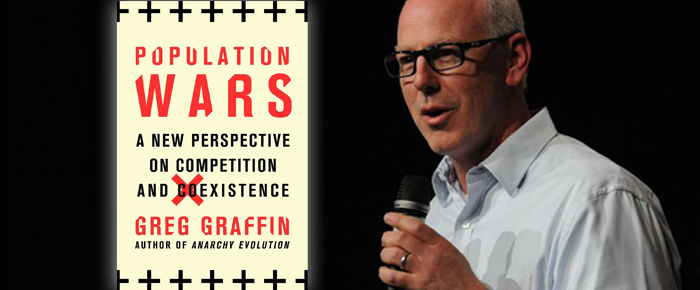
By Heidi Simmons
—–
“Population Wars”
by Greg Graffin
Non-Fiction
—–
It doesn’t take expert analysis to recognize the world is tumultuous and life as we know it is changing. The future is precarious for all living things on our beautiful planet. Without a change of attitude and action, the human species is facing extinction. In Population Wars: A New Perspective on Competition and Coexistence (Thomas Dunne Books, 320 pages), author Greg Graffin shows that there are solutions and there is indeed hope to save our race.
Author Graffin has a Ph.D in zoology and is a professor at Cornell University. He considers himself an Evolutionary Biologist and Naturalist. His undergraduate study was in anthropology and he received his master’s in geology at UCLA. This cross-disciplinary study provides a wider and intensified scientific view of our current environmental situation.
Graffin is also a songwriter and singer. He is a founding member of the California punk band Bad Religion. The group regularly tours and took stage at Coachella Fest just this year.
Population Wars goes back to the beginning of existence on this planet and the non-human populations that formed life. As the earth has evolved, it has consisted of continually changing populations of organisms and other life forms that succeeded and failed over time. Ultimately, these population wars resulted in the life that exists now.
Whether it is bacteria, viruses or the human immune system, population wars are taking place everyday. Humans have come to understand some of these microscopic wars. With vaccines we have tried to fight and control deadly disease. Yet, viruses and bacteria continue to adapt, evolve and change.
But, as Graffin points to the scientific evidence, even on the microscopic level, population wars are never won. There is always coexistence and equilibrium. It is the relationship between the populations that make life stronger, more resilient and successful. It is a symbiosis.
Using the war narrative, Graffin moves to human populations and man-made wars. Here again, he shows that populations are never totally eliminated but finally assimilate and eventually recuperate. Graffin asks that we look, not only at how these wars started, but why the wars came about. He looks at the environmental circumstances and the effect it had on the success or failure of the warring populations.
The most significant war is Graffin’s attack on Darwinism and the idea of “survival of the fittest” and the theory of “competition” between species. Graffin shows how theses theories became popular, why it persists today and the need for a new perspective.
Graffin takes apart Darwin’s evolutionary theory and shows that there is no evidence of survival of the fittest and species competition. Graffin blames Darwin’s theories and Neo-Darwinism for human destructive behavior, negative attitudes toward society and justification for all types of population wars – human and non-human. He believes we cannot hide behind Darwin’s theories any longer and must instead face the real problems that loom before us – our changing environment.
Throughout Population Wars, Graffin presents evidence that it is better to engage in a beneficial symbiotic relationship and coexist with other living things because it plays the biggest role in successful evolution and our existence. He believes that as a species, humans can and should strive for greater empathy and environmental balance.
Graffin proves that the most fundamental factor in our evolution is the environment. He has hope that we will shift our thinking away from Darwin’s theory and move to managing our environment where biodiversity is respected as humans become true stewards of the planet. If we do not, there is little hope that humans will survive the next extinction.
This is one of my favorite reads this year! Graffin is not only knowledgeable but he writes well. He brings lessons we have learned in part over our lifetime and puts it together in a way that provides a new big picture view. His arguments are clear, well-stated and fairly presented. I understand his worldview and get his pressing agenda.
Because Graffin is a scientists as well as a popular musician, I believe he is able to breach the gap between two worlds. Scientists have been reluctant to negate Darwin’s theories because of its tenure in the scientific community. Graffin believes enough is enough – there is no survival of the fittest and competition between spices is a “philosophical error.” This is the twenty-first century. It’s time to rethink and to act accordingly.
Population Wars helped me better appreciate evolution and how we are indeed a part of it. We are all passing through. The earth is alive! And life will continue to evolve whether humans are here or not!
But Graffin acknowledges that our species is different in that we can consider our circumstances and make a conscious effort to do something. The solution to save human kind is attainable by caring for and managing our environment.
In a chapter called “Know Thyself, Don’t Lie to Thyself,” Graffin takes on “free will.” Again he states the history and how the issue of “free will” has changed from a religious term to a term in the court system. This made me rethink how choices are made. He didn’t nail the subject, but it’s enough to reconsider how much free will actually exists.
There are long sections on geology, biology and history, which I found fascinating and insightful. If this is a problem for you as a reader, I suggest skimming through, because it’s worth getting to the thoughtful conclusion.
Graffin is a nonbeliever. Yet, like a preacher, he calls us to be good stewards of the earth and empathetic toward others. Good religion or bad, I’m on board to save the environment and human species!












































